Attached files
| file | filename |
|---|---|
| 8-K - 8-K - Invitation Homes Inc. | a8-k110618nareitdeck.htm |

NAREIT Conference November 7-8, 2018 Together with you, we make a house a home.
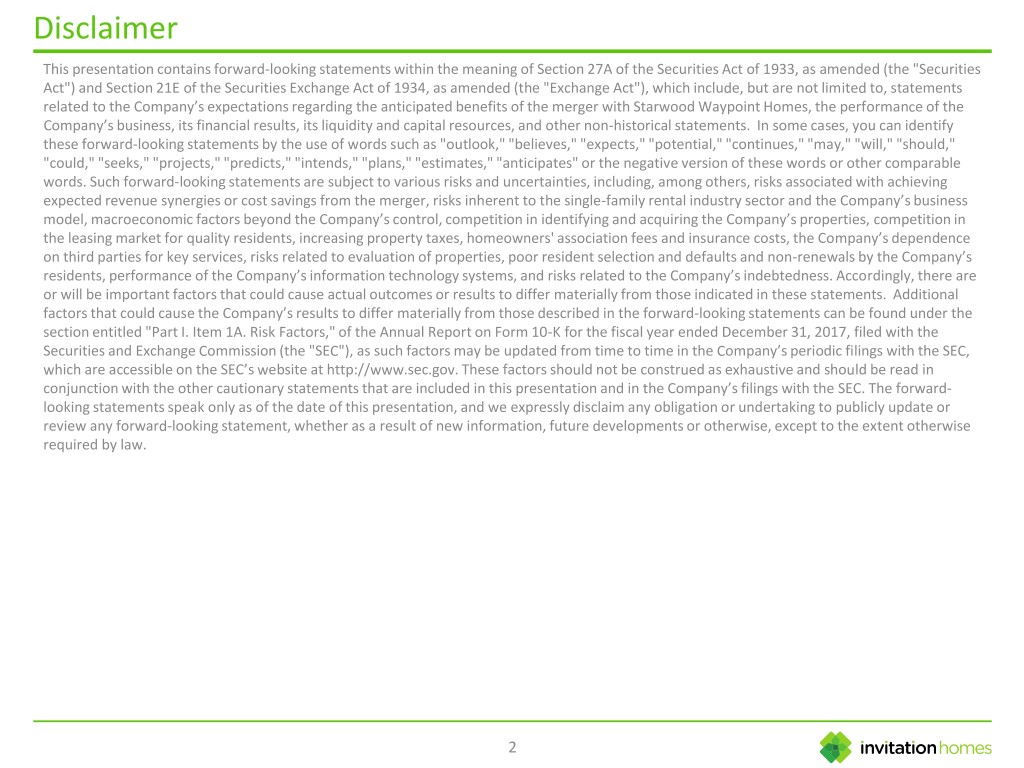
Disclaimer This presentation contains forward-looking statements within the meaning of Section 27A of the Securities Act of 1933, as amended (the "Securities Act") and Section 21E of the Securities Exchange Act of 1934, as amended (the "Exchange Act"), which include, but are not limited to, statements related to the Company’s expectations regarding the anticipated benefits of the merger with Starwood Waypoint Homes, the performance of the Company’s business, its financial results, its liquidity and capital resources, and other non-historical statements. In some cases, you can identify these forward-looking statements by the use of words such as "outlook," "believes," "expects," "potential," "continues," "may," "will," "should," "could," "seeks," "projects," "predicts," "intends," "plans," "estimates," "anticipates" or the negative version of these words or other comparable words. Such forward-looking statements are subject to various risks and uncertainties, including, among others, risks associated with achieving expected revenue synergies or cost savings from the merger, risks inherent to the single-family rental industry sector and the Company’s business model, macroeconomic factors beyond the Company’s control, competition in identifying and acquiring the Company’s properties, competition in the leasing market for quality residents, increasing property taxes, homeowners' association fees and insurance costs, the Company’s dependence on third parties for key services, risks related to evaluation of properties, poor resident selection and defaults and non-renewals by the Company’s residents, performance of the Company’s information technology systems, and risks related to the Company’s indebtedness. Accordingly, there are or will be important factors that could cause actual outcomes or results to differ materially from those indicated in these statements. Additional factors that could cause the Company’s results to differ materially from those described in the forward-looking statements can be found under the section entitled "Part I. Item 1A. Risk Factors," of the Annual Report on Form 10-K for the fiscal year ended December 31, 2017, filed with the Securities and Exchange Commission (the "SEC"), as such factors may be updated from time to time in the Company’s periodic filings with the SEC, which are accessible on the SEC’s website at http://www.sec.gov. These factors should not be construed as exhaustive and should be read in conjunction with the other cautionary statements that are included in this presentation and in the Company’s filings with the SEC. The forward- looking statements speak only as of the date of this presentation, and we expressly disclaim any obligation or undertaking to publicly update or review any forward-looking statement, whether as a result of new information, future developments or otherwise, except to the extent otherwise required by law. 2

Southern California I. INVITATION HOMES INVESTMENT HIGHLIGHTS 3
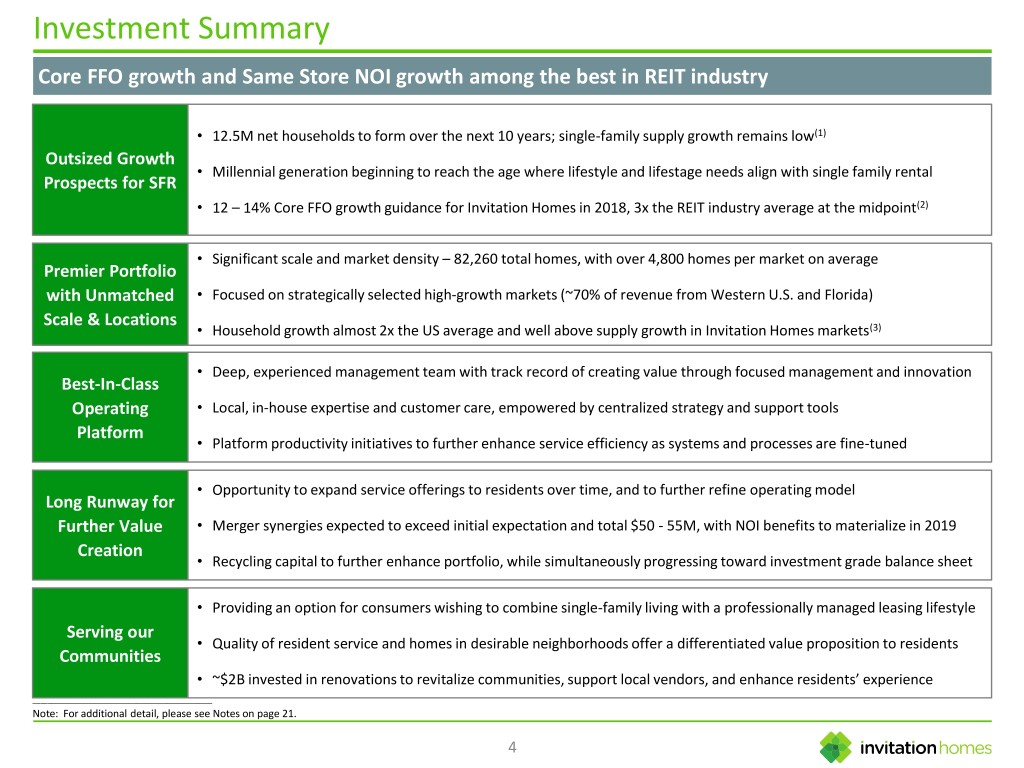
Investment Summary Core FFO growth and Same Store NOI growth among the best in REIT industry • 12.5M net households to form over the next 10 years; single-family supply growth remains low(1) Outsized Growth • Millennial generation beginning to reach the age where lifestyle and lifestage needs align with single family rental Prospects for SFR • 12 – 14% Core FFO growth guidance for Invitation Homes in 2018, 3x the REIT industry average at the midpoint(2) • Significant scale and market density – 82,260 total homes, with over 4,800 homes per market on average Premier Portfolio with Unmatched • Focused on strategically selected high-growth markets (~70% of revenue from Western U.S. and Florida) Scale & Locations • Household growth almost 2x the US average and well above supply growth in Invitation Homes markets(3) • Deep, experienced management team with track record of creating value through focused management and innovation Best-In-Class Operating • Local, in-house expertise and customer care, empowered by centralized strategy and support tools Platform • Platform productivity initiatives to further enhance service efficiency as systems and processes are fine-tuned • Opportunity to expand service offerings to residents over time, and to further refine operating model Long Runway for Further Value • Merger synergies expected to exceed initial expectation and total $50 - 55M, with NOI benefits to materialize in 2019 Creation • Recycling capital to further enhance portfolio, while simultaneously progressing toward investment grade balance sheet • Providing an option for consumers wishing to combine single-family living with a professionally managed leasing lifestyle Serving our • Quality of resident service and homes in desirable neighborhoods offer a differentiated value proposition to residents Communities • ~$2B invested in renovations to revitalize communities, support local vendors, and enhance residents’ experience ________________________________________________ Note: For additional detail, please see Notes on page 21. 4

Premier Single-Family Portfolio Unmatched scale and density focused in strategically-selected high-growth locations ~70% of Revenue Generated in Western U.S. and Seattle Florida Regions 5% Minne- apolis 2% >4,800 Northern Chicago California Homes per Market 5% on Average 6% Denver 3% Las Vegas Southern 3% Nashville Carolinas California Phoenix 1% 5% 13% 7% >95% Atlanta Dallas Jacksonville 12% of Revenue from Markets 3% 2% with >2,000 Homes Houston Orlando 3% 7% Tampa 10% South Florida 4.4 – 4.5% 13% Expected Growth in 2018 Percent of 3Q18 Core revenues Same Store Core Revenue 5
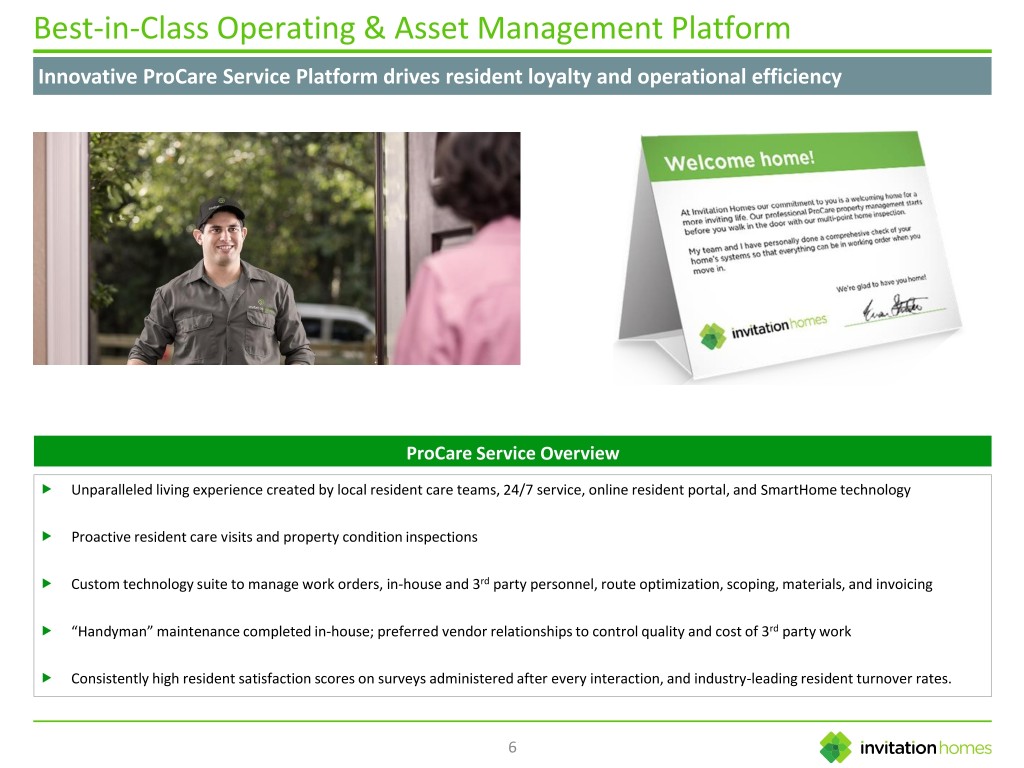
Best-in-Class Operating & Asset Management Platform Innovative ProCare Service Platform drives resident loyalty and operational efficiency ProCare Service Overview Unparalleled living experience created by local resident care teams, 24/7 service, online resident portal, and SmartHome technology Proactive resident care visits and property condition inspections Custom technology suite to manage work orders, in-house and 3rd party personnel, route optimization, scoping, materials, and invoicing “Handyman” maintenance completed in-house; preferred vendor relationships to control quality and cost of 3rd party work Consistently high resident satisfaction scores on surveys administered after every interaction, and industry-leading resident turnover rates. 6
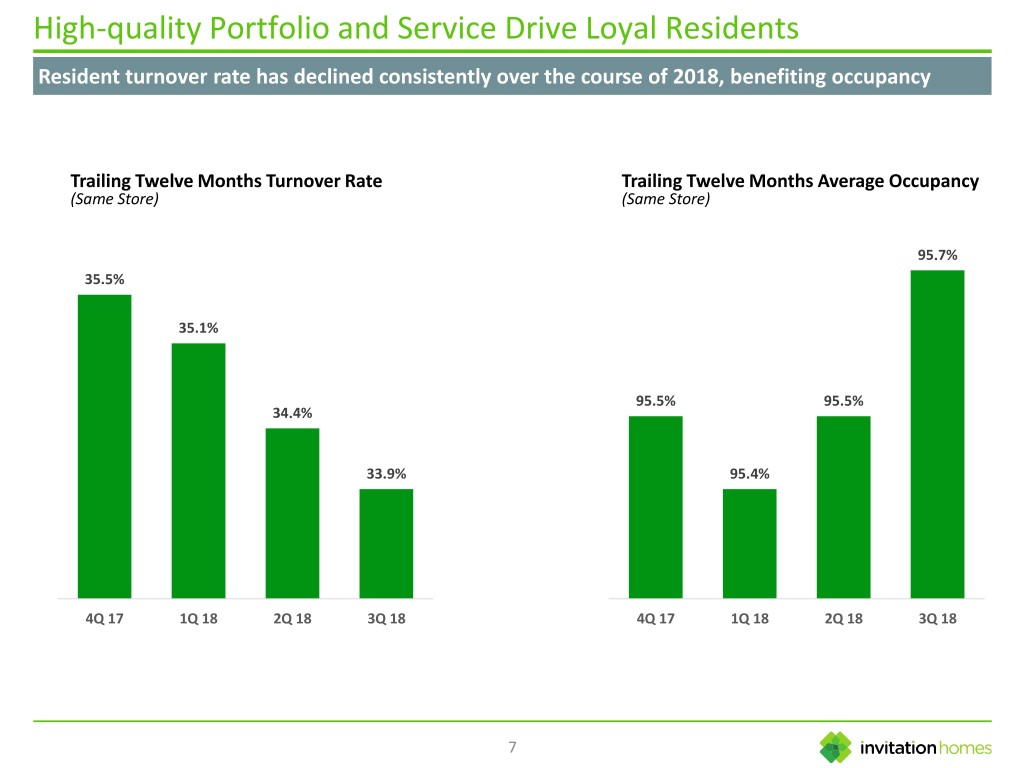
High-quality Portfolio and Service Drive Loyal Residents Resident turnover rate has declined consistently over the course of 2018, benefiting occupancy Trailing Twelve Months Turnover Rate Trailing Twelve Months Average Occupancy (Same Store) (Same Store) 95.7% 35.5% 35.1% 95.5% 95.5% 34.4% 33.9% 95.4% 4Q 17 1Q 18 2Q 18 3Q 18 4Q 17 1Q 18 2Q 18 3Q 18 7

Strong Revenue Growth Momentum Leasing performance versus prior year strengthened further in October 2018 Same Store Average Occupancy Same Store New Lease Rent Growth 96.1% 5.5% 4.9% 95.8% 95.8% 95.8% 95.7% 95.5% 3.3% 3.3% 3.3% 95.2% 2.5% 95.0% 1.8% 1.4% Q1 Q2 Q3 October Q1 Q2 Q3 October 2017 2018 2017 2018 8

Merger Integration Progressing Well On track to surpass benefits initially committed to residents, team members, and shareholders Integration Elements Outcome / Progress Update Timing Seamless transition upon merger close, with uninterrupted service 1 Resident service ✓ and consistently high resident satisfaction scores Complete Tools and strategies aligned effectively, resulting in continued 2 Revenue management ✓ strong execution and accelerating revenue growth in 2018 Complete Fully integrated and functioning more efficiently than legacy 3 Accounting systems ✓ systems at both the corporate and property levels Complete Rollout completed ahead of schedule; Fine-tuning required before 4 R&M technology ✓ service technician productivity benefits can be realized Complete Go-forward personnel in-place and prepared for transition to 5 Personnel decisions ✓ unified operating structure Complete Office space consolidated early in local markets, enhancing team 6 Office consolidation ✓ cohesiveness and preparedness for unified field platform rollout Complete Technology build-out on track for 4Q18 completion, and detailed 7 Field operations platform On schedule plan in-place for piloting and gradual rollout by 1H19 Cost synergies expected to total $50 – 55 million on an annualized run-rate basis: ► $41 million of run-rate synergies ($36 million G&A / property management, $4 million NOI, and $1 million CapEx) earned in as of October 31, 2018, outpacing expectation for 75% synergy achievement by year-end 2018 ► Remaining synergies to be two thirds attributable to NOI and unlocked after implementation of field operations platform 9

Pursuing Investment Grade Balance Sheet Continuing to lower leverage, prolong maturities, and reduce borrowing costs Low Cost, Flexible Capital Structure Making Progress Toward Investment Grade ► No debt maturities until 2020(1) ► Recent refinancings have further strengthened our balance sheet: 12/31/17 9/30/18 ► Recent swaps raise fixed or swapped to fixed rate debt to above 90% beginning in 2020 from ~80% today 5.2 4.1 Weighted Average Maturity (Yrs) ► Flexible capital stack that is mostly prepayable at no cost 47% ► Significant liquidity with over $1.1 billion available 42% through revolving lines of credit and unrestricted cash % of Assets Unencumbered ► Cash flow growth provides opportunity to reduce Net Debt / Adjusted EBITDAre by ~1 turn per year, assuming debt were repaid with excess cash after dividend ________________________________________________ Note: For additional detail, please see Notes on page 21. 10
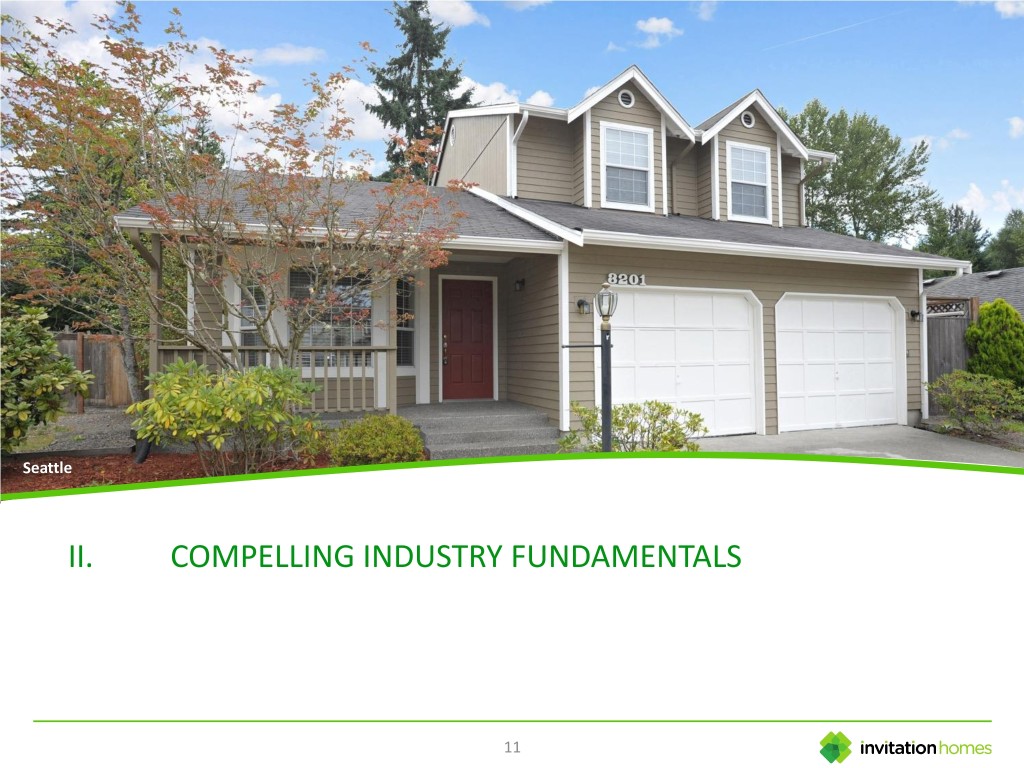
Seattle II. COMPELLING INDUSTRY FUNDAMENTALS 11

Favorable Macro Fundamentals Supply and demand remain supportive of growth, especially in Invitation Homes markets Projected Household Formations Total Single Family Permits (Household Growth, 2019e) (% of households) 1.9% 1.6% 1.0% 1.0% U.S. Average Invitation Homes Markets(1) 1985 - 2017 Average in Invitation Homes Markets, Invitation Homes Markets(1) 2018e(1) ________________________________________________ Source: Company public filings, John Burns, and BLS. Note: For additional detail, please see Notes on page 21. 12

Demographics Create a Long Runway for Household Formations JBREC expects 12.5M net households to form over the next 10 years Younger generations have shown a higher tendency to rent than own their homes 58% of the 12.5M net new households to be formed by 2025 are expected to be renters (1) 2016 - 2025e Forecast Household Growth by Decade Born (Millions) 15 25.8 million gains 14.0 10 5 5.9 4.3 13.3 million losses 1.6 0 (1.4) (0.1) (3.1) (3.8) Net Change in Households (Millions) Householdsin Change Net (4.9) (5) Pre 1930s 1930s Savers 1940s Achievers 1950s Innovators 1960s Equalers 1970s Balancers 1980s Sharers 1990s 2000s Globals Connectors Generation ________________________________________________ Source: John Burns Real Estate Consulting (JBREC) – Demographic Trends and the Outlook for Single Family Rentals, April 2017. Note: For additional detail, please see Notes on page 21. 13
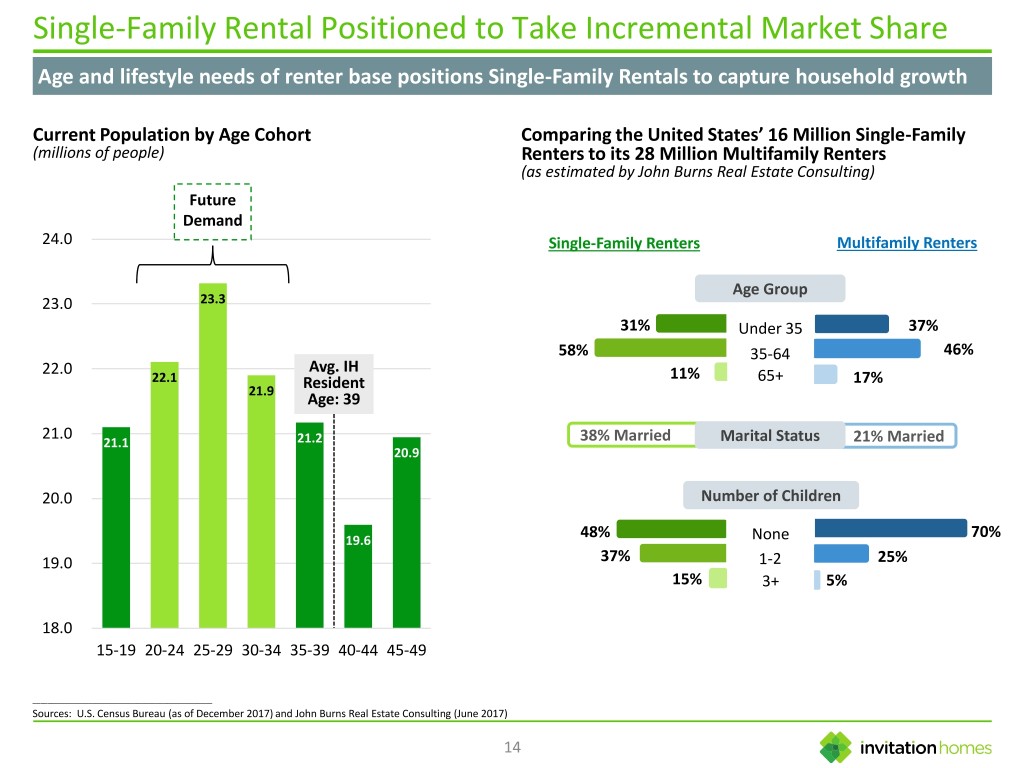
Single-Family Rental Positioned to Take Incremental Market Share Age and lifestyle needs of renter base positions Single-Family Rentals to capture household growth Current Population by Age Cohort Comparing the United States’ 16 Million Single-Family (millions of people) Renters to its 28 Million Multifamily Renters (as estimated by John Burns Real Estate Consulting) Future Demand 24.0 Single-Family Renters Multifamily Renters Age Group 23.0 23.3 31% Under 35 37% 58% 35-64 46% 22.0 Avg. IH 11% 22.1 Resident 65+ 17% 21.9 Age: 39 21.0 21.1 21.2 38% Married Marital Status 21% Married 20.9 20.0 Number of Children 70% 19.6 48% None 19.0 37% 1-2 25% 15% 3+ 5% 18.0 15-19 20-24 25-29 30-34 35-39 40-44 45-49 ________________________________________________ Sources: U.S. Census Bureau (as of December 2017) and John Burns Real Estate Consulting (June 2017) 14
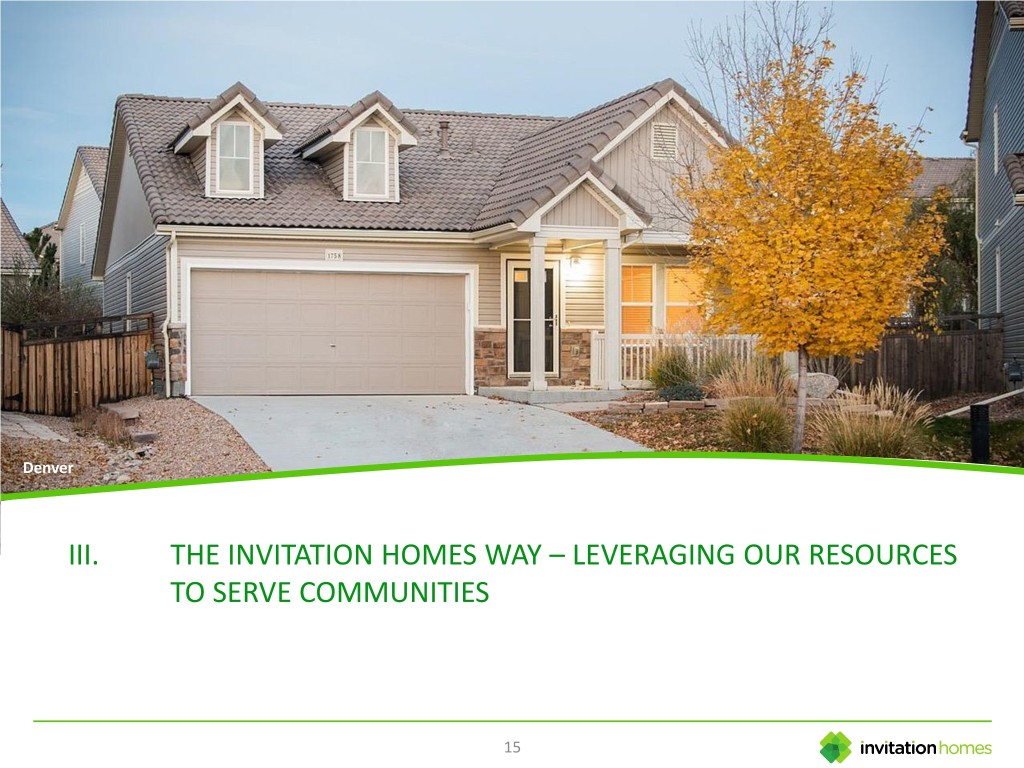
Denver III. THE INVITATION HOMES WAY – LEVERAGING OUR RESOURCES TO SERVE COMMUNITIES 15

Our Mission, Vision, and Values Mission Together with you, we make a house a home. Vision Values Unshakeable Integrity Continuous Excellence We hold ourselves accountable We always find a way to Be the premier choice in home leasing by to act with honesty, trust and innovate and deliver. continuously enhancing our residents’ respect. Standout Citizenship living experience. Genuine Care We strive to benefit our We serve with heart. neighbors and our communities. 16

Positive Impact on Residents and Communities Providing a high quality leasing experience for families and improving communities Resident Experience Community Investment “ProCare” professional resident services provided by in- $2 billion investment rehabilitating homes house local management and service teams $267 million annual local taxes supporting communities 24/7 resident service hotline $223 million annually to maintain homes for residents Resident First Look program for home sales Technology-enhanced resident experience $32 million paid to homeowner associations annually High quality homes in desirable neighborhoods Hundreds of local vendors supported Superior customer experience creating loyal residents 17

Orlando IV. APPENDIX 18

Glossary Adjusted EBITDAre EBITDA, EBITDAre and Adjusted EBITDAre are supplemental, non-GAAP measures often utilized to evaluate the performance of real estate companies. We define EBITDA as net income or loss computed in accordance with accounting principles generally accepted in the United States (“GAAP”) before the following items: interest expense; income tax expense; and depreciation and amortization. National Association of Real Estate Investment Trusts ("Nareit") recommends as a best practice that REITs operating as real estate companies which report an EBIDA performance measure also report EBITDAre in all financial reports for periods beginning after December 31, 2017. We define EBITDAre, consistent with the Nareit definition, as EBITDA, further adjusted for gain on sale of property, net of tax and impairment on depreciated real estate investments. Adjusted EBITDAre is defined as EBITDAre before the following items: share-based compensation expense; IPO related expenses; merger and transaction-related expenses; severance; casualty losses, net; acquisition costs; and interest income and other miscellaneous income and expenses. Average Occupancy Average occupancy for an identified population of homes represents (i) the total number of days that the homes in such population were occupied during the measurement period, divided by (ii) the total number of days that the homes in such population were owned during the measurement period. Core Funds from Operations (Core FFO) and Adjusted Funds from Operations (AFFO) FFO, Core FFO, and Adjusted FFO are supplemental, non-GAAP measures often utilized to evaluate the performance of real estate companies. FFO is defined by Nareit as net income or loss (computed in accordance with GAAP) excluding net gains or losses from sales of previously depreciated real estate assets, plus depreciation, amortization and impairment of real estate assets, and adjustments for unconsolidated partnerships and joint ventures. Core Revenues Core revenues for an identified population of homes reflects total revenues, net of any resident recoveries. Net Operating Income (NOI) NOI is a non-GAAP measure often used to evaluate the performance of real estate companies. We define NOI for an identified population of homes as rental revenues and other property income less property operating and maintenance expense. Rental Rate Growth Rental rate growth for any home represents the percentage difference between the monthly rent from an expiring lease and the monthly rent from the next lease, and, in each case, reflects the impact of any amortized non-service rent concessions and contractual rent increases. Leases are either renewal leases, where our current resident chooses to stay for a subsequent lease term, or a new lease, where our previous resident moves out and a new resident signs a lease to occupy the same home. 19
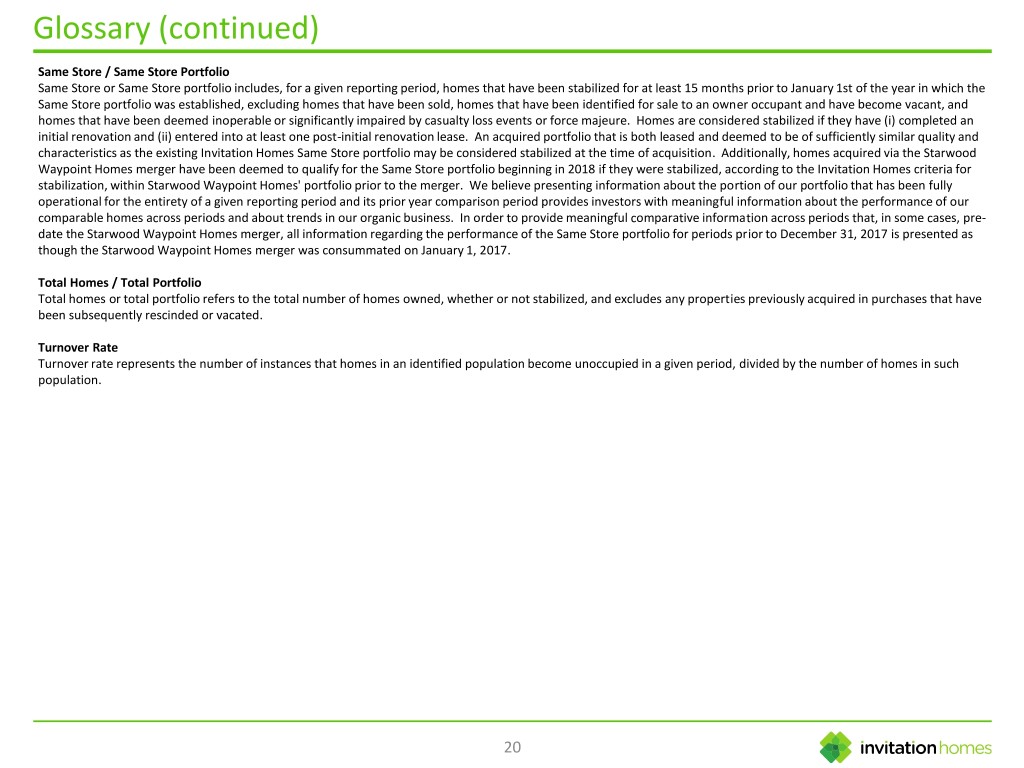
Glossary (continued) Same Store / Same Store Portfolio Same Store or Same Store portfolio includes, for a given reporting period, homes that have been stabilized for at least 15 months prior to January 1st of the year in which the Same Store portfolio was established, excluding homes that have been sold, homes that have been identified for sale to an owner occupant and have become vacant, and homes that have been deemed inoperable or significantly impaired by casualty loss events or force majeure. Homes are considered stabilized if they have (i) completed an initial renovation and (ii) entered into at least one post-initial renovation lease. An acquired portfolio that is both leased and deemed to be of sufficiently similar quality and characteristics as the existing Invitation Homes Same Store portfolio may be considered stabilized at the time of acquisition. Additionally, homes acquired via the Starwood Waypoint Homes merger have been deemed to qualify for the Same Store portfolio beginning in 2018 if they were stabilized, according to the Invitation Homes criteria for stabilization, within Starwood Waypoint Homes' portfolio prior to the merger. We believe presenting information about the portion of our portfolio that has been fully operational for the entirety of a given reporting period and its prior year comparison period provides investors with meaningful information about the performance of our comparable homes across periods and about trends in our organic business. In order to provide meaningful comparative information across periods that, in some cases, pre- date the Starwood Waypoint Homes merger, all information regarding the performance of the Same Store portfolio for periods prior to December 31, 2017 is presented as though the Starwood Waypoint Homes merger was consummated on January 1, 2017. Total Homes / Total Portfolio Total homes or total portfolio refers to the total number of homes owned, whether or not stabilized, and excludes any properties previously acquired in purchases that have been subsequently rescinded or vacated. Turnover Rate Turnover rate represents the number of instances that homes in an identified population become unoccupied in a given period, divided by the number of homes in such population. 20
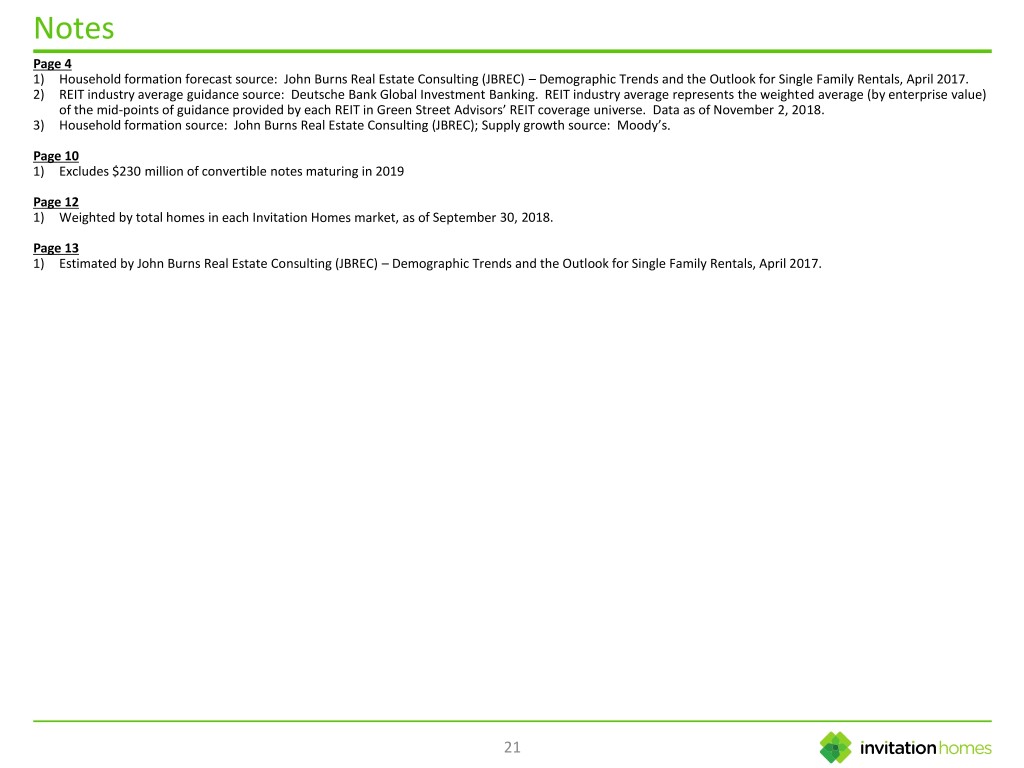
Notes Page 4 1) Household formation forecast source: John Burns Real Estate Consulting (JBREC) – Demographic Trends and the Outlook for Single Family Rentals, April 2017. 2) REIT industry average guidance source: Deutsche Bank Global Investment Banking. REIT industry average represents the weighted average (by enterprise value) of the mid-points of guidance provided by each REIT in Green Street Advisors’ REIT coverage universe. Data as of November 2, 2018. 3) Household formation source: John Burns Real Estate Consulting (JBREC); Supply growth source: Moody’s. Page 10 1) Excludes $230 million of convertible notes maturing in 2019 Page 12 1) Weighted by total homes in each Invitation Homes market, as of September 30, 2018. Page 13 1) Estimated by John Burns Real Estate Consulting (JBREC) – Demographic Trends and the Outlook for Single Family Rentals, April 2017. 21
